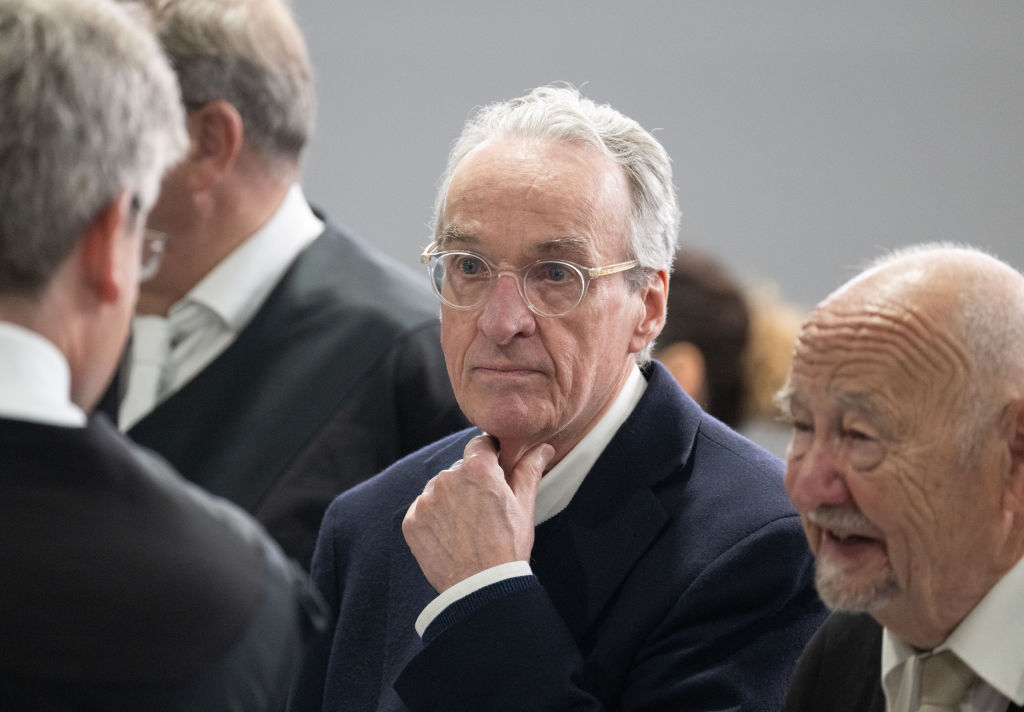Germany is in the grip of one of the most extensively covered courtroom dramas in recent memory. On trial is an alleged terrorist group of nine men and women centered around the seventy-two-year-old aristocrat Heinrich XIII Prince Reuss. They stand accused of having plotted to violently overthrow the state before they were arrested in December 2022. The groups’ network is said to reach far into Germany’s armed forces, police and politics, making the case one of the most bizarre and troubling in modern German history.
The case is so large that it had to be split into three parts. The first one began in Stuttgart in April. Another one is due to start in June in Munich. On Tuesday, the most high-profile segment, the case against Reuss and those prosecutors deem to be his associates, was launched in Frankfurt in a lightweight hall specially built for this purpose.
The trials are expected to go on for years and cost huge amounts of money
Some of the attending journalists felt reminded of the historic trials against the so-called Red Army Faction, a left-wing terrorist organization in West Germany held responsible for thirty-four deaths as well as abductions, bombings and robberies in the Seventies and Eighties. It was one of the biggest threats to the post-war order the country had seen up to that point.
The trial in Frankfurt is being treated just as seriously. Security is tight. The venue is surrounded by razor wire and heavily armed police. Many of the attending observers brought folding chairs in anticipation of the long queues to pass security checks.
The authorities are right to be cautious. During the investigation into the group’s activities, police found hundreds of weapons, ranging from firearms to bladed weapons and munition. One of the defendants in the Munich part of the trial, named as Markus L., had shot at police with a semi-automatic rifle when they raided his flat in March 2023. Several bullets hit police shields at chest height, one hit a policeman’s arm, and another officer was injured.
Markus L. is on trial for attempted murder but is by no means the only dangerous individual in the group. Prosecutors say that Heinrich XIII Prince Reuss, a real estate developer, acted as one of the leaders of a terrorist group called “Patriotic Union,” which supposedly met at his castle in central Germany to plot an armed coup. The idea was to storm the parliament building in Berlin, arrest politicians and install Reuss as head of state.
The prosecution also says that it was the aristocrat’s role to reach out to Russia to gain support for the undertaking. His girlfriend Vitalia B., who is a Russian national and also on trial in Frankfurt, stands accused of establishing contact with the Russian consulate in Leipzig and accompanying Reuss there.
Reuss’s defense argued on Tuesday that it was true that he had held meetings at his home, but claimed they were of a political nature only. “He denies he was ever violent,” the lawyer added. “He denies that he ever wanted to kill people or made any plans to do so.”
The defense attempted to brush off the indications of a military putsch as the harmless fantasies of a group of delusional cranks. “They’re not terrorists. They’re slightly crazy,” the defense lawyer insisted and painted an image of a group of people opposed to Covid measures who went down a rabbit hole of conspiracy theories together.
Crazy conspiracy theorists they may well be, and, as more and more absurd details emerge of the case, it’s tempting not to take them seriously. The group are part of the Reichsbürger movement which is estimated to have around 23,000 followers. They don’t believe the current German state is legitimate and want to restore monarchical rule since they deem the forced abdication of the last German Kaiser at the end of World War One invalid. The indictment suggested that the passing of the late Queen Elizabeth II may have been regarded as a “signal” to act by some in the group.
But despite such bizarre revelations, it would be a huge mistake to underestimate the group’s capacity for violence and disruption. Rüdiger von Pescatore, another pensioner in his seventies on trial in Frankfurt, is said to be the ringleader of the military arm of the Patriotic Union. He is a former commander of a paratroop battalion in the Bundeswehr, Germany’s armed forces, and one of several ex-military figures on trial. He and his associates are alleged to have attempted to reach out to army and police units to gather support for a coup, holding several documented meetings and scouting out military compounds.
A former Member of Parliament for the right-wing party Alternative für Deutschland (AfD) also entered the courtroom at around half past ten on Tuesday, looking frail and gloomy in her thick down jacket. Birgit Malsack-Winkemann repeatedly shook her head indignantly as the indictment was read out for over two and a half hours.
Before her arrest, the fifty-nine-year-old lived in a terraced house in Berlin, where she is said to have prepared for “Day X,” the day of the storming of parliament, by stocking up on tinned food and bottled water. Police also found firearms, flammable liquids and a target sheet with holes in it, which she had brought home from the shooting range where she was a member.
Malsack-Winkemann’s real value to the group, however, was insight knowledge of the Bundestag, the German parliament, and access to it. The prosecution alleges that she brought other Patriotic Union members there to scout out the logistics for the day of the coup.
The list of the other defendants makes for troubling reading, too. There is a man named as Michael F., for instance, who is an ex-policeman. A politician called Johanna F.-J. who is alleged to have convinced an associate to donate €150,000 ($163,000) to the group. More funds are said to have been organized by a financial advisor who allegedly donated over €160,000 ($174,000) to the cause. The indictment estimates the group had around €500,000 ($542,000) at their disposal in total.
The trials are expected to go on for years and cost huge amounts of money. The purpose-built court in Frankfurt alone is estimated to have cost €1 million ($1.08 million). The presiding judge leads a panel of six subordinate judges. A total of twenty-six defense lawyers accompany the nine defendants.
The scale of the trial reflects what is at stake. Despite the fact that the plans of the Patriotic Union didn’t come to fruition, the group have huge potential for disruption because of their deep reach into army, police, politics and funding opportunities. Figureheads like Reuss give the fanatical end of the Reichsbürger scene the aristocratic flair they crave. It’s a potent combination that should ring alarm bells rather than draw ridicule. The German authorities are right to treat this as one of the biggest threats to the state in Germany’s post-war history.
This article was originally published on The Spectator’s UK website.


























Leave a Reply